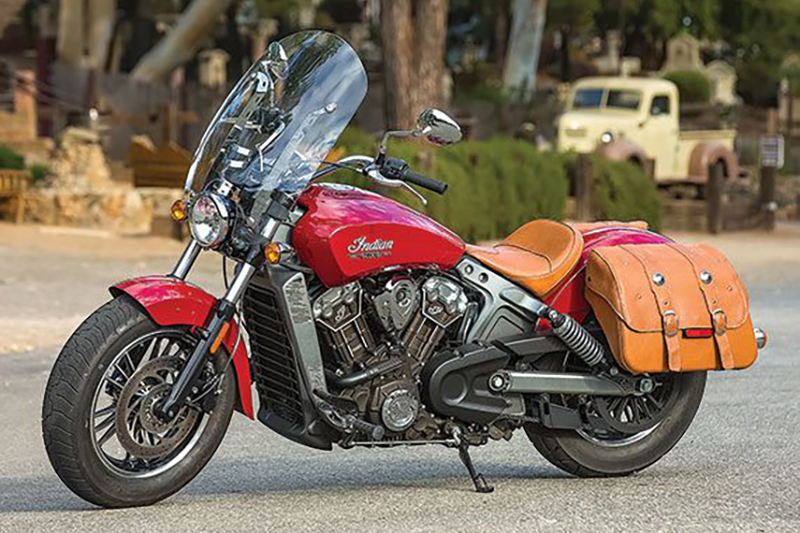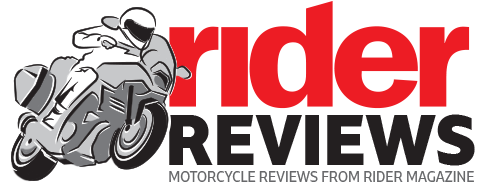2016 Indian Scout

Road Test Review
Our first review of Indian’s bold new Scout cruiser was way back in the November 2014 issue, and it was based on the 2015 model’s introduction at the Sturgis Rally in South Dakota, so this full test of a production Scout here at home is overdue. First there was a production delay, then we got into our busy test season, and before we knew it the 2016s were just around the corner. Now we’re glad we waited for one, because the 2016 Scouts have a couple nice new features, and our test bike is a new version with ABS.
Technically speaking, the latest Indian Scout motorcycle and the famous originals from the 1920s to 1940s have little in common…and that’s a good thing. Reminisce all you want about the greatness of the early Scouts—how they mastered the Wall of Death, took the “Wrecking Crew” to victory or how the 101 Scout of 1928-31 was the best motorcycle
Indian ever made—actually riding one today with its foot clutch, tank shifter, hardtail rigid frame and whopping 18 horsepower would snap you out of your reverie pretty quickly. It was pretty surprising, in fact, how many pundits were expecting more of a 1930s Scout replica when Indian introduced the new one. Such a bike might be fun to collect, ogle and take for the occasional putt, but Indian is here to build and sell motorcycles we want to ride, not merely admire.
That said, it is remarkable how many visual cues to the bike’s heritage Indian was able to incorporate in the modern Scout, with its liquid-cooled and fuel-injected engine, stout aluminum frame, good front and rear suspension and light cast wheels. Squint a little and you can see vestiges of the early Scouts in the new one’s V-twin engine, which has machined edges, polished valve covers and cylinder stud casings that vaguely resemble pushrods—all of which reminds us of the early 37 and 45ci V-twins. Dual lay-down rear shocks offer 3 inches of suspension travel while completing the “rigid triangle” chassis appearance of its forebears, and the lines of the shapely fuel tank and kicked-up front fender are similar to those of the early Scouts. The smallish teardrop headlight and solo seat complete the look, yet offer contemporary brightness and comfort.
These styling licks separate the middleweight Scout from the cruiser herd quite well, but its most unique feature is the 1,133cc (69ci) 60-degree V-twin, which has DOHC heads and four valves per cylinder. Despite its large bore and short stroke, this versatile engine churns out one of the flattest torque curves we’ve ever seen, with more than 58 lb-ft of torque on tap at the rear wheel from 2,500 to 7,600 rpm, yet it still makes 85.2 peak horsepower at 7,800 rpm, just shy of its 8,200 rpm redline. These numbers don’t tell the story as well as riding the Scout, however, which quickly reveals its split personality. Lighter and easier to ride than Indian’s larger 111ci Chiefs, the Scout’s ride-by-wire throttle pours out rumbling low-end power like warm molasses. The typical unhurried cruiser enthusiast will love its seamless low-end and midrange power delivery, and how it never feels busy or buzzy down low, even at cruising speed on the highway in top gear (about 3,500-4,000 rpm). Even if you never rev it above 5,000 rpm you’ll have all of the power, sound and feel you ever need. The only fly in the ointment is the bike’s stiff, non-adjustable clutch lever, which those with smaller hands may find taxing in traffic.
On the other hand, thanks to its counterbalancer, short stroke and big 60mm throttle bodies, the Scout revs to higher engine speeds willingly and without much vibration, so you can wring it out more between gears and push it in the corners without it feeling strained. Although the 6-speed transmission shifts with a clunk and has a long throw like many American cruisers, it’s still possible to hustle the Scout along a winding back road at a sporty clip without feeling like you’re pushing it. On warm days you’ll feel some engine heat on your legs at stops and in traffic, but it’s hardly a showstopper.
While the single-disc brakes front and rear are merely OK and the front brake lever lacks an adjuster, the Scout has decent cornering clearance for a cruiser and 16-inch wheels front and back (which have new machined highlights for 2016) that help give it competent handling. Despite lacking adjustments, the 41mm fork is calibrated for a good compromise between cruiser soft and firm for a fast pace in the corners, and it has a generous 4.7 inches of travel. Dual rear shocks get along surprisingly well with just 3 inches and are much more compliant than a lot of cruisers in this class, though a bit more rebound damping would probably keep them from kicking back over sharp bumps. At first the ring-and-locknut preload adjustment seems inconvenient and out-of-place, but in addition to offering the right look, it has far more adjustment range than a ramped collar, a potential benefit to two-up riders who get one of the optional pillion seats and footpegs for passengers.
Although the 2016 Scout comes in five colors, the ABS model is only available in Indian Red. It’s a great shade, but we think the stock Desert Tan solo seat and optional Genuine Leather saddlebags look best on the shiny Thunder Black version. Once you install the $149.99 mounting spools on that big rear fender, the $999.99 bags go on and come off
easily, and hard plastic liners insure that they keep their shape. They have narrow openings that limit their usefulness, though they will hold a small laptop bag, purse, rainsuit or your jacket liner. We also tried Indian’s $449.99 Quick-Release 21-inch Windshield for the Scout, which curls the wind around most of your upper body and makes it much easier to ride long distances. You’ll still need earplugs, and the shield causes the front end to hunt ever so slightly, but most riders won’t even notice it. Other accessories include a luggage rack, rider and passenger backrests and chrome-spoke wire wheels with black rims.
The Scout’s ultra-low 26.5-inch seat height allows most riders to flatfoot it at stops, and its relatively light weight makes it easy to hoist off the sidestand and support. Though the bucket seat tends to lock you in one position, it is nicely padded, and the ergonomic triangle of seat, handlebar and footpegs feels natural and comfortable. Indian offers several accessories to help adjust the Scout’s fit to smaller and larger riders, too, including extended and reduced reach seats, foot control adapters and handlebars. Executing U-turns and pushing the Scout around would be easier with more steering sweep lock-to-lock, but the bike’s turning radius is within reason.
The Scout’s sole instrument is handlebar-mounted, leaving plenty of room on the steel fuel tank for a magnetic tank bag. The analog speedometer with an inset digital display has a clock and gear indicator, and it can be toggled among a tripmeter, engine temperature, tachometer and odometer. Maintenance is fairly simple on this bike with belt final drive and long 20,000-mile valve adjustment intervals, and tires are basic bias-belts made for Indian by Kenda that should be longwearing and inexpensive to replace. Besides lacking a steering lock, the Scout’s only real flaw, in fact, is its 3.3-gallon fuel tank, which at our average of 43.5 mpg limits the fun to less than 150 miles before you need to fill-up with premium. And there’s no fuel gauge, only a warning light that comes on with 0.5-gallon remaining.
For some riders that short range will make the Scout off-limits; others will find that the bike’s performance, comfort and good looks are worth a few more pit stops. Whether you load it up with a passenger, luggage and a windshield or leave it bare, the Indian Scout is a fun, versatile retro cruiser with a famous past that will please entry-level and seasoned riders alike.

